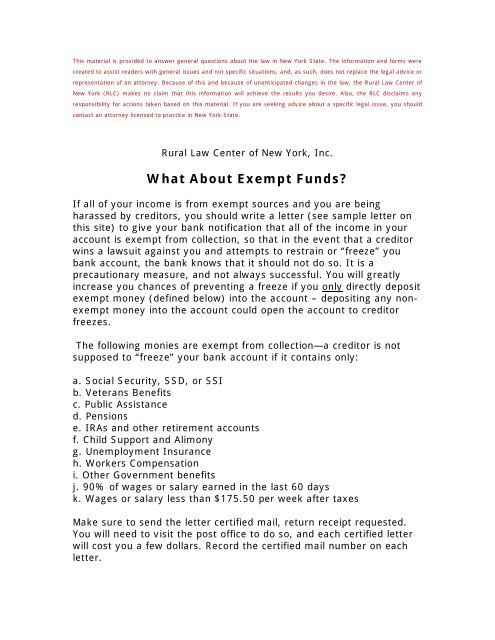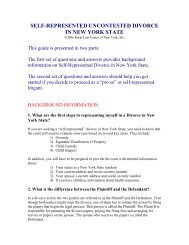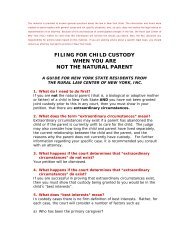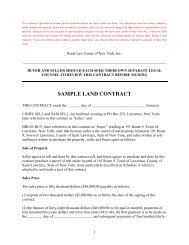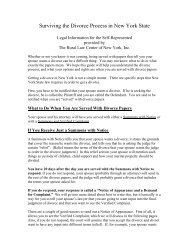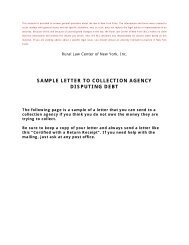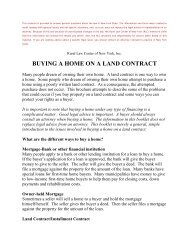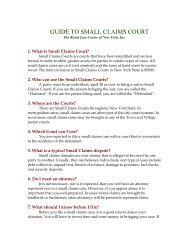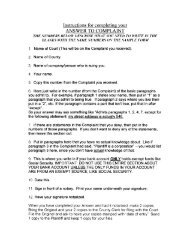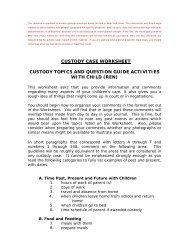Exempt Funds? - Rural Law Center of New York
Exempt Funds? - Rural Law Center of New York
Exempt Funds? - Rural Law Center of New York
- No tags were found...
Create successful ePaper yourself
Turn your PDF publications into a flip-book with our unique Google optimized e-Paper software.
This material is provided to answer general questions about the law in <strong>New</strong> <strong>York</strong> State. The information and forms werecreated to assist readers with general issues and not specific situations, and, as such, does not replace the legal advice orrepresentation <strong>of</strong> an attorney. Because <strong>of</strong> this and because <strong>of</strong> unanticipated changes in the law, the <strong>Rural</strong> <strong>Law</strong> <strong>Center</strong> <strong>of</strong><strong>New</strong> <strong>York</strong> (RLC) makes no claim that this information will achieve the results you desire. Also, the RLC disclaims anyresponsibility for actions taken based on this material. If you are seeking advice about a specific legal issue, you shouldcontact an attorney licensed to practice in <strong>New</strong> <strong>York</strong> State.<strong>Rural</strong> <strong>Law</strong> <strong>Center</strong> <strong>of</strong> <strong>New</strong> <strong>York</strong>, Inc.What About <strong>Exempt</strong> <strong>Funds</strong>?If all <strong>of</strong> your income is from exempt sources and you are beingharassed by creditors, you should write a letter (see sample letter onthis site) to give your bank notification that all <strong>of</strong> the income in youraccount is exempt from collection, so that in the event that a creditorwins a lawsuit against you and attempts to restrain or “freeze” youbank account, the bank knows that it should not do so. It is aprecautionary measure, and not always successful. You will greatlyincrease you chances <strong>of</strong> preventing a freeze if you only directly depositexempt money (defined below) into the account – depositing any nonexemptmoney into the account could open the account to creditorfreezes.The following monies are exempt from collection—a creditor is notsupposed to “freeze” your bank account if it contains only:a. Social Security, SSD, or SSIb. Veterans Benefitsc. Public Assistanced. Pensionse. IRAs and other retirement accountsf. Child Support and Alimonyg. Unemployment Insuranceh. Workers Compensationi. Other Government benefitsj. 90% <strong>of</strong> wages or salary earned in the last 60 daysk. Wages or salary less than $175.50 per week after taxesMake sure to send the letter certified mail, return receipt requested.You will need to visit the post <strong>of</strong>fice to do so, and each certified letterwill cost you a few dollars. Record the certified mail number on eachletter.
When sending this letter, also notify the creditor that is suing you thatyou have only exempt income and that they should not attempt t<strong>of</strong>reeze your bank account. (See sample <strong>of</strong> this letter on this site, also.)Sending these letters will not stop a creditor from suing you or winninga money judgment against you, but it may help to minimize the risk <strong>of</strong>your bank account being frozen. You can send this letter at any time,but it is best to send it before you are sued.If you are being sued, make sure that you call Social Security (orVeteran’s Benefits, Public Assistance, etc.) and ask them to send yourchecks in paper form instead <strong>of</strong> having them directly deposited intoyour frozen account.Lastly, make sure you keep copies <strong>of</strong> everything.


